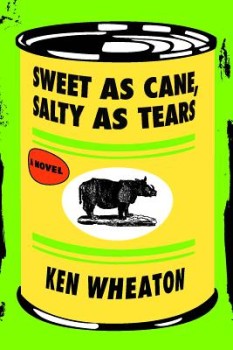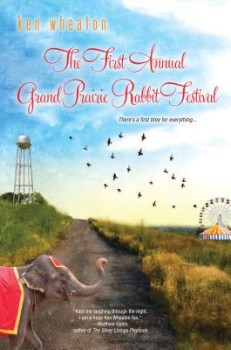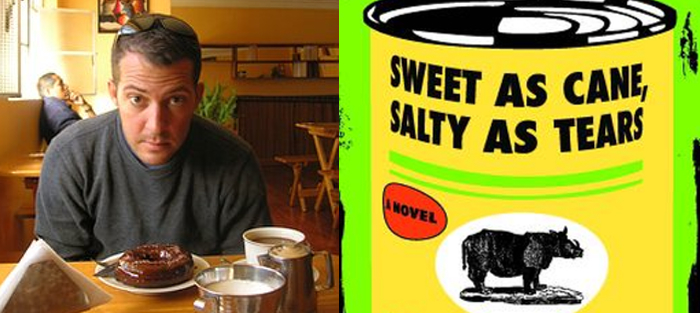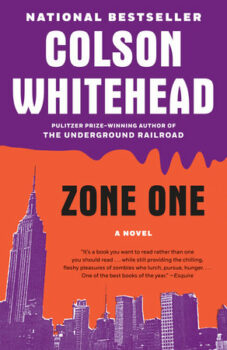Some novelists fend off writing out of sheer laziness, while others who relish the identity of being a writer more than writing itself never get around to producing a finished manuscript. Then there are novelists who never intended to become writers, and yet who nevertheless end up stumbling upon writing, their true vocation, and go on to produce a substantial body of work. Ken Wheaton, author of three novels, his latest being Sweet as Cane, Salty as Tears (Open Road Media), squarely falls into the last category.
As Managing Editor at Advertising Age, Ken Wheaton once had aspirations of being an Air Force pilot, but his eyesight wasn’t quite as sharp as it should be, and so that didn’t work out. Wheaton then turned his attention to Marine Biology; however, his dismal math skills were an indication that he should find something else to do with his life.
Katherine Fontenot, the protagonist of Sweet as Cane, Salty as Tears, has spent decades trying to ignore her Louisiana roots. When Katherine is forced to go home, she discovers that her past is inescapable. Ken Wheaton writes about family dysfunction, familial roots, and love with humor and empathy.
Through a mutual friend, Ken and I have shared pints of Guinness and watched college football, but until now we had never chatted about writing, Raymond Carver, living in New York, or running marathons. In addition to Sweet as Cane, Salty as Tears, Wheaton is the author of The First Annual Grand Prairie Rabbit Festival (2010), and a book of speculative fiction entitled Bacon and Egg Man (2013).
Interview:
Richard Fulco: How did you come to writing?
Ken Wheaton: Two very different things happened as an undergrad at Long Island University-Southampton that took me down the writing path. I’d always dabbled in it, but never considered it a viable option. But I wasn’t exactly taking to Marine Biology—not enough discipline, too much drinking—so I ended up switching my major to English, where I figured I’d be a big, important writer. At the same time, I was doing things like writing these blistering critiques of the cafeteria’s attempts at “Cajun” food and posting them on the cafeteria suggestion board. I also got involved with the college newspaper during the Bush-Clinton election.
The paper needed a Republican columnist, and I was happy to be the guy. Coming out of Louisiana and reacting to the extremely politically correct campus around me, it was an easy role to fill, and I had fun with it. Especially since the guy writing in support of Clinton was a roommate of mine. People probably thought we hated each other, when in fact we were drinking buddies. And I think we both ended up voting for Perot (though we didn’t tell anyone that).
But I never mixed the two types of writing back then. Fiction was serious. Everything else was a lark. It didn’t even occur to me to mix them. It didn’t even occur to me that I was writing “humorous essays.” If someone had told me I was writing “essays,” I probably would have quit doing it.
I ended up being the editor of the school paper and worked at a couple of newspapers on Long Island after that. But journalism felt like a bit of a grind out in the real world, so I decided I’d go back to school in Louisiana to focus on fiction and at least get a Masters and some teaching experience.
I didn’t exactly take to teaching, and that little bit of journalism experience served me well when I moved to New York City in 1999. I couldn’t even get a book publishing company to look at me, but I landed a gig at a trade magazine called Marine Log then went to TheStreet.com as a copy editor and then Advertising Age. I started at Ad Age as a copy editor—I didn’t want “work writing” to burn me out. But I got bored with copyediting and worked my way into a columnist position and then a more general editing position, and now I’m the Managing Editor and write ad reviews and other things that tickle my fancy. It can be a grind, especially with the challenges facing the news publishing industry these days, but it can also be fun; it keeps me in touch with some of the fastest changing parts of the culture (not that I pay that much attention).
What books got you excited as an undergraduate student?
When I got to college, I was angry. I had stuff to say. I was so serious. The fiction had to be serious literary fiction for whatever reason. All the stuff I was reading in college was serious. Raymond Carver. Harry Crews. I didn’t have a Bukowski phase, which makes me part of the one percent. Harry Crews was sufficient enough for a Bukowski substitute.
How about graduate school? Who were your influences then?
A fair chunk of grad school at the University of Southwestern Louisiana (now University of Louisiana-Lafayette) was spent in traditional classes reading more traditional fiction. Lots of Melville. I don’t need to do that to myself again. Actually, the most influential class I took—especially in relation to the latest novel—was a Southern Women’s Literature class. Obviously, we tackled Welty and O’Connor. But we also looked at Carson McCullers and Bobbi Ann Mason and Kaye Gibbons. Gibbons’ A Virtuous Woman socked me right in the face the first time I read it. That opening paragraph still breaks my heart every time.
 Let’s talk about your most recent novel. Like you, the protagonist of Sweet as Cane, Salty as Tears, Katherine Fontenot, is from Louisiana, and like you she has been living in New York for some time. In her case, more than thirty years. Would she identify herself as a New Yorker?
Let’s talk about your most recent novel. Like you, the protagonist of Sweet as Cane, Salty as Tears, Katherine Fontenot, is from Louisiana, and like you she has been living in New York for some time. In her case, more than thirty years. Would she identify herself as a New Yorker?
She would like to, but at the same time I think if she’s honest enough there is a layer in her from where she’s from. She moved to New York in the middle 80s, so she would not be one of those people who would be nostalgic over the shittier New York. [Laughter.] Her first steps off the bus, she gets into trouble. She’s almost attacked.
There’s a scene early on. She’s living in Cobble Hill. Snow is starting to fall and she acknowledges that it’s magical for about five minutes and in two hours it will turn into gray sludge.
She might wish she wasn’t from Louisiana, but you can’t escape that. It’s what shapes you.
Katherine’s thirty years in New York are an attempt to ignore her roots. What do you think it means to be a New Yorker?
I think it’s a matter of feeling comfortable here, liking it. Ultimately, finding it hard to imagine living anywhere else. Tonight it took me an hour and a half to get home because there was a broken rail on the two train and it screwed up the four train—but then you start to panic when you imagine living somewhere else. I’m going to be bored. It’s not like I go to shows here, theater every night, concerts, it’s just that whatever the energy is I’m afraid that if I move to a paradise, three weeks at the beach…God, I got to get out of here.
Now I can envision moving back to Louisiana. You get older. You’ve lived in a 700-square-foot apartment for “X” number of years. I just had a barbecue for my work colleagues and had the fire department called on me for the smoke in the backyard. [Laughter.]
Do you identify yourself as a Southern writer? Or have you lived in Brooklyn long enough now that that title doesn’t fit?
I wouldn’t classify myself as a Brooklyn writer. Those particular writers are kind of quirky, and I like them but I’m just not that literary and connected in that scene. It took me a good long while before I felt comfortable writing about Brooklyn, knowing my way around and not seeming like a complete newbie.
As a Southerner, and a Cajun in particular, it becomes quickly evident when someone is writing about my home state and doesn’t know what the hell he or she is talking about. So I always imagined the same would be true for a place like Brooklyn or New York. Ninety-eight percent of the country might not realize you’re missing little details, but that two percent is going to let you hear it. I mean, hell, I was reading a piece about the subway in the New York Times once and the writer—who was, I think, one of their transit writers—described the F Train coming above ground after Carroll Street and running above ground all the way to the park. “WHICH IS NOT WHAT HAPPENS!” I shouted at my computer screen at the time.
It’s probably easier to write about a place like New York or Brooklyn these days because there are so many people moving through, but I do like to get the broad strokes right.
So how did your latest novel come about?
The inspiration for this story was my mom’s family—a big, sprawling Cajun family that grew up in Grand Prairie, Louisiana. My mom told me a story about my aunt hoping the tooth fairy would come. They were broke. The tooth fairy didn’t show up because they didn’t have any money. My aunt found a dead rabbit on the doorstep, and with the logic of a five-year-old thought that was the tooth fairy. The dead thing on the porch is the tooth fairy. [Laughter.] That was the genesis of the [new book]. I had the idea back in ’98 or ’99. I couldn’t get a story out of it. I had a bunch of interesting anecdotes.
Sadly, the same sister with the tooth fairy story passed away a couple of years ago. I went down for the funeral. Big, crazy family. We were at the after, after thing, and I was literally eating Popeye’s chicken. One of my relatives came up to me—we’re hardcore Cajun—and she was like, “You’re probably writing something right now, aren’t you?” Well, I wasn’t but now that you’ve mentioned it. That gave me the genesis for this thing. I was terrified before the book came out that my mom’s family was going to read it, but they all loved it. You think you’re being clever. You create composite characters. I’ve pulled one over on them. [Laughter.] You didn’t fool anybody.
What were you afraid your family would react to?
There is a lot of fiction and a great deal of compositing going on in the novel, but there is also a lot I’ve just taken from life. In my previous books, what I stole from life was mostly from my own. Mostly. But with this one, I was digging through the family’s history. Don’t get me wrong. I’ve always wanted to tell a version of their story because I admired it. I wanted to honor them. But we all know how sometimes that gets screwed up in the execution. So I was a little worried that someone would think I was airing dirty laundry or capitalizing on my aunt’s passing or something like that.
Your novels all have an element of humor. Did you set out to write a humorous novel this time, as well?
 The First Annual Grand Prairie Rabbit Festival started out kind of serious. It was about a Catholic priest in a really small town. A friend of mine, Jason Primm, said, “You should lighten this one up.” Jason had basically instigated the novel to begin with. And he was also the guy who kept pushing me to write in a tone closer to my blogging voice, which was light and funny, even when I was ranting about something as serious as student protests in Iran.
The First Annual Grand Prairie Rabbit Festival started out kind of serious. It was about a Catholic priest in a really small town. A friend of mine, Jason Primm, said, “You should lighten this one up.” Jason had basically instigated the novel to begin with. And he was also the guy who kept pushing me to write in a tone closer to my blogging voice, which was light and funny, even when I was ranting about something as serious as student protests in Iran.
Another friend, Jackie Cangro, one of the best first readers of my stuff, said, “This is just you” —meaning that the pains I’d taken to make sure my first novel was not a thinly disguised autobiography were falling short. Even though the main character is a priest! Okay, sure, she knew me personally so maybe other readers wouldn’t have picked up on it, but the character was a little too close to me (in a bad, boring way) and nothing happened to him.
So I took their advice (after about two years of NOT taking their advice) and rewrote it, trying to layer in some humor, trying to layer in some conflict, and switching from third person to first person–which allowed the priest, Father Steve, to be more like me in voice, but also less like me in other ways.
So I made the first one funny. The second one, Bacon and Egg Man, was easier because I knew I was going to aim for humor from the outset and it was written as political satire—the main character is a bacon and egg dealer in a future in which all of Michael Bloomberg’s dreams about nutrition guidelines and laws have come true. So it was ready, set, go.
Sweet as Cane, though, was tougher. Part of it was that the original germ for the idea happened back in the days when I was still hell-bent on being serious. Which is sort of crazy since the germ of the story was this incident with the tooth fairy. And stupid me, I originally tried to play that straight back in 2000 or whatever the first time I tried this project. But I shelved the thing back then because that was literally the only piece of the story I had.
So years later, I take it up again, and now I’m supposed to be a funny guy.
I have some set pieces in there that are pretty funny. It probably could have been funnier. I was trying to strike a balance between funny and serious and warm and nostalgic. But there are some really dark places in there. Kind of like South Louisiana in general. Death plays a pretty prominent role in the book, so obviously it’s not going to be wall-to-wall laughs. But they’re in there.The comedy bits are harder than anything else. I find that it’s not that hard to make people cry. I always want to get one or two of those in the book.
Your first novel was published in 2010. So you’ve written three novels in four years. What kind of changes have you seen in your writing?
I think I’m getting a little more sure of myself. (I say this now, but I’m sure one of those “I’M THE WORST” moments is just around the corner.)
If nothing else, I’ve gotten the process down. Idea. Outline. Rough draft of pen on paper, two hours or so a day, done in six months. Then the editing and revising starts, and that takes at least another six months, if not longer.
I’ve learned that it’s okay for the first draft to be kind of dull. If I can think of set pieces while I’m writing the first draft, great. But it’s easier to add a little absurdity on the second pass once the pressure of finishing the damn thing–of knowing that you have an actual story–is off of you.
Of course, idiot that I am, on the current project I haven’t done an outline and I’m just typing directly into the computer to see if I’d get something a little more fluid. All my other books have been written in longhand. This is the first book that I’m writing directly on a computer. I’m about to pull the plug on that approach, though, if for no other reason than every café I write in now has free wi-fi and I can’t resist the siren call of Twitter and Facebook and Gawker and those god-awful BuzzFeed lists.
A lot of writers are either runners or walkers. You’re obviously drawn to novels, long form—marathons not sprints. Do you get ideas while running?
I’ll work through plot points. I don’t listen to music while I’m running, which people find completely odd, especially for a two-hour run. Marathons are a huge project, but you tackle it one mile at a time. That actually helped me with writing novels. It’s two hours at a time. You just do the small stuff. Some writers think they have to write fifteen pages. You’ll drive yourself nuts trying to write fifteen pages. I’m happy with two hours of writing whether it’s one page or ten. Something got down on paper and it might suck, but you’ll have a chance to go back to it. Writing is like a marathon.
What are you working on now?
I’m working on another novel. It’s going to drive my agent crazy because I can’t settle on a genre. The next work isn’t going to be women’s fiction, but rather a bit of comedy and crime novel. Hopefully. It will be a mix of Louisiana and Brooklyn, again, but the main action will be mostly set in Louisiana.A lot of it has to do with reality TV. I’ve read a lot of Elmore Leonard.






